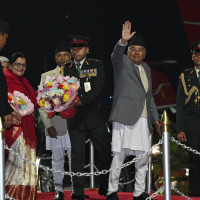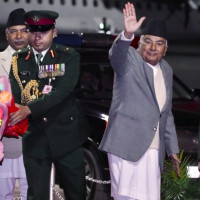- Monday, 2 February 2026
To graduate or not to graduate: Nepal faces dilemma over LDC upgrade
Kathmandu, Oct. 12: Amidst the estimated 3-5 per cent loss to the economy due to arson and vandalism of the public and private property and businesses during the Gen-Z movement in September this year, and fear of poor economic performance, apprehensions have begun surfacing about Nepal’s graduation to the ‘Developing Country (DC)’ from the current Least Developed Country (LDC) status.
Several business leaders, economists and trade experts suggested seeking a deferral to the graduation in order to buy time to put the country’s economy back on track.
While 76 people were killed in the protests, properties worth hundreds of billions were vandalised and set afire during the youth-led movement. According to preliminary estimates of the concerned authorities, damage to the public infrastructure is more than Rs. 103 billion while the Federation of Nepalese Chambers of Commerce and Industries (FNCCI) put the damage to the private properties above
Rs. 83 billion
Attack on private properties and businesses – including 21 outlets of Bhatbhateni Super Market, international hotel chain Hilton, multinational telecommunication company Ncell, automobile showrooms, Chaudhary Group’s electronics factory, base station of Chandragiri Cable Car, and house of Non-Resident Nepali Association’s founding President Dr. Upendra Mahato – has sent negative message about ‘doing business’ environment in Nepal.
Foreign investors, some of whom are at the final stage in making decision to bring in investment here, are now in ‘wait and see’, according to the business community. President of Garment Association of Nepal (GAN), Pashupati Pandey, a foreign investor who was seeking a plot of about 22 bigahas to set-up a garment industry that would employ about 15,000 people has now put his plan on hold.
Industries like garment, handicraft, carpet, felt and tea are afraid that they would be unable to compete with the products from countries like India, China and Bangladesh due to low productivity and high production and transportation cost in Nepal as the waiver to customs duties would be removed following the graduation.
A small group of development experts have expressed their worries over the possible end of obtaining grant for development projects.
Should Nepal seek deferral?
The recent untoward situation has paved the ground for the postponement of the graduation from the LDC, said Pandey. “There is a lot to do in terms of reducing production cost, improving trade infrastructure, enhancing the quality of ICT facilities and branding Nepali products at the international markets. We need some time for that,” he said.
Nepal exports garments worth about Rs. 10 billion a year, of which goods worth Rs. 4 billion enter the US market while European market is also equally important.
Nepal is getting favoured treatment and duty-free access to most of these markets, and even if a 10-per cent duty is levied, it would be difficult for Nepali products to compete with Bangladeshi or Chinese products.
However, for the short-term, Nepal has advantage over its neighbours due to US President Donald Trump’s policy of reciprocal customs duties.
Economist Dr. Paras Kharel, said that since the country had delayed graduation due to earthquake and COVID-19 pandemic, it wouldn’t be unusual to seek another deferral.
“Postponement of graduation from LDC status does not mean an indefinite deferral. It might be just an extra three years. That would still be precious time for reconstruction and recovery from the destruction just witnessed and, hopefully, for creating the basic conditions for a truly stable and prosperous Nepal,” he said.
According to Dr. Kharel, Nepal’s businesses have now been battered by the destruction of physical capital, a key pillar of a UN agency’s productive capacities index. The tourism industry a major foreign exchange earner and employer, faces its greatest challenge since the pandemic while attracting foreign investment was
always a struggle.
The deaths and destructions during the protests warrant a reconsideration of the decision to graduate, he said.
“However, the government should seek the deferral only after being clear about what it would do for better preparation and utilise the time available,” said Dr. Kharel.
According to him, the recent economic growth estimates by the World Bank (WB) is a warning call. The multilateral donor has recently downgraded the growth rate to 2.1 per cent from the projection of 4.5 per cent made in April this year.
“In Nepal, recent unrest and heightened political and economic uncertainty is expected to cause growth to decline to 2.1 per cent in FY25/26, with a potential range of negative 1.5–2.6 per cent,” the WB further warned.
But FNCCI President Chandra Prasad Dhakal said that since Nepal has moved much ahead with the preparations for graduation, the country should not seek a deferral but lobby to continue the benefits provided to an LDC country.
“Graduation of Nepal can improve Nepal’s image at the international stage and force the producers and exporters to boost the quality of their products and reduce the price which will ultimately make the economy healthy,” he said.
Meanwhile, several experts cite Bangladesh case as a model for Nepal in seeking postponement for graduation.
Bangladesh, that witnessed almost similar youth uprising in July last year, is reevaluating its status and readiness for graduation albeit the government denied the postponement.
According to a report of The Business Standards, the government had decided to commission an independent – comprehensive and impartial – assessment by the United Nations (UN) in response to the call from the private sector to delay the graduation. The assessment will evaluate Bangladesh’s preparedness, identify external risks after graduation, and boost confidence.
Preparations at final stage
The National Planning Commission (NPC), which is the focal agency for LDC graduation, said that no proposals or discussions were made for postponing the country’s entry to the ‘DC club’.
The planning body had also formulated ‘Smooth Transition Strategy’ last year.
A senior official of the NPC said that it is a matter that should be discussed by all the stakeholders and decided by the government. And, the government has not indicated any moves for the postponement.
Prime Minister Sushila Karki has also sought cooperation from multilateral and regional bodies for the smooth transition after the country’s graduation.
Addressing Nepal’s ambassadors and heads of missions a few days ago, she said that the country must further strengthen its cooperative ties with friendly nations and enhance collaboration with multilateral and regional organisations for the smooth transition to the developing nation from the LDC and achieve the Sustainable Development Goals (SDGs) by 2030.
However, the NPC official said that although the proposal to extend the grace period could be a better option the decision should be made by the UN agencies such as the Committee for Development Policy (CDP), which evaluates countries and recommends graduation.
Spokesperson of the Ministry of Foreign Affairs, Lok Bahadur Poudel Chhetri, said that the preparations for the graduation have been satisfactory.
“For now, Prime Minister’s opinion is the ultimate. We must prepare for the graduation,” he said.
Ready in 2015
The United Nations General Assembly (UNGA) in November 2021 had ratified the proposal to graduate Nepal to a ‘developing’ country status from its current position of a ‘Least Developed Country (LDC)’ with a transition of five years in 2026.
The country that was in the LDC club since the origin of the concept in 1971 had met the two of the three criteria to be recognised as the developing nation in a decade ago and was scheduled to graduate in 2018 but citing the devastating Gorkha Earthquake in 2015, the government requested the United Nations not to move ahead with the graduation process.
The five-year preparatory period for graduation (granted to Nepal, Bangladesh and Laos) was unusual as the usual policy has three-year period.
According to the UN Office of the High Representative for the Least Developed Countries, Landlocked Developing Countries and Small Island Developing States (OHRLLS), a country should meet two of the three criteria to graduate to the ‘developing’ status from the LDC – PC-GNI of US$ 1,306, Human Assets Index (HAI) at a score of 66 or above and Economic and Environmental Vulnerability Index (EVI) at a score of 32 or lower.
Alternatively, there is a provision to graduate a country on the basis of income-only criterion if it achieves three times the graduation threshold of $3,918.
Nepal’s HAI is at 76.3 which is much higher than the LDCs average of 59.6 and EVI is at 29.7 while LDCs average is 40.6.
Although Nepal was elevated to lower-middle income country in 2020, it is yet to meet the threshold of Per Capita Gross National Income (PC-CNI) of US$ 1,306. In 2024 review, it missed it by just US$ 6.
Currently, 14 LDCs are in various stages of the graduation process, four will graduate from the category by 2027 – including Solomon Islands, which is due to graduate in December 2027.
Likewise, Cambodia and Senegal are slated to graduate in December 2029. Other in the pipeline are – Rwanda, Uganda, Tanzania, Kiribati, Tuvalu, Comoros, Djibouti and Myanmar.
Mixed impacts
According to the UN and Nepal’s Smooth Transition Strategy, a country’s graduation reflects sustained development progress which enhances national pride and creates positive international image. It might result in improved international perception which may encourage Foreign Direct Investment (FDI) and investors may view Nepal as a more stable and creditworthy destination.
The supports from the UN and development partners won’t be severed immediately after the graduation, which will be available for smooth transition for several years. Nepali business people want the same facility to be prolonged.
Likewise, since the graduation requires sustained progress over at least nine years, it is helping Nepal to build structural and institutional strength and encouraging better planning, policy discipline and institutional reforms.
“None of the countries to graduate so far have fallen back into the list. The criteria are designed asymmetrically, so that it is harder to leave the list than it is to be included in the first place,” read a document of the UN-OHRLLS.
However, LDC graduation comes at a cost of losing preferential tariffs for exports to the EU, China and Canada while major export goods like carpets, garments, herbs and footwear could face higher tariff.
As export diversification to new markets will be more difficult, the government should formulate diversification strategy to remain competitive. Dr. Kharel said that the National Trade Integration Strategy 2023 could serve a policy agenda for this.
Likewise, with the graduation, Nepal will lose grant support from various bilateral and multilateral donors, lose access to LDC Fund under the UNFCCC, and lose priority for UN technical and financial programmes. But the country is already opting for bilateral or multilateral loans and it has conducted sovereign credit rating and obtained BB- rating which is considered ‘satisfactory’.
On a smaller scale, the country’s budget contributions to the UN will be increased while travel support for attending international meetings will be lost.















-original-thumb.jpg)